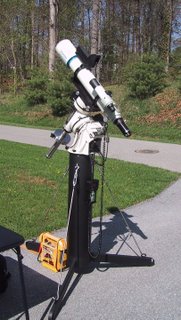On Amateur Astronomy

As some of you know, I'm an amateur astronomer. It's a great hobby, I've been involved with it since I was 14 years old and I really enjoy relaxing under the night sky and commanding a big stack of advanced optics and robotics, not to mention some really cool cameras to be able to see the heavens and enjoy them more fully than many people do.
When you first buy a telescope, it's a pretty daunting experience. There are different types of optical systems, different types of mount, automated pointing systems, CCD cameras, eyepieces, film cameras, focusers, dew control electronics, counterweights, pointing aids, and a host of reading material, not to mention a bunch of specialized software to use all the gear together effectively. Now, a lot of time when people first get into astronomy, the first thing they think to do is just go out and buy a telescope. Seems like a natural thing to do, eh?
When you go to the store to get your telescope, you're likely to be assaulted by a barrage of marketing about all the wonders you will observe with your shiny new telescope. The pictures on the side of the 60mm achromatic refractor you're likely to end up with promise you that you'll be able to observe the universe from your back yard and it'll look a lot like this. When you get your shiny new scope home and set it up in the back yard for the first time, you'll soon discover that reality and marketing sometimes are at odds, because what you're really going to see will look a lot more like this (if you're lucky and spent some money on a decent scope and you live under a really dark sky). Chances are that you're not even going to see that because you haven't been versed in using averted vision to pick out detail in faint objects. Sometimes when I let people look through my telescopes for the first time and I show them something pretty incredible like a galaxy that's 50 million light years away, they barely see anything. It's always easiest to show them something bright and obvious like Jupiter or Saturn, something that requires little skill to find or observe and that will give quick gratification.
In fact, if you're going to get good use out of that telescope, you're going to have to become familiar with a whole host of topics that you may not have thought a whole lot about prior to getting into astronomy. Things like celestial coordinate systems, ephemeris, polar alignment techniques, averted vision, calculating the magnification and field of view of an optical system, different object catalogs and their contents, gauging the viewing quality of the sky, amateur meteorology (hauling out 200lbs of gear on a night when a cold front is going to bring rain 2 hours after you get setup is a bummer), not to mention all the topics of astrophotography if you really do want to see sights like those promised on the box in which the telescope came.
When you get right down to it most people's entry into astronomy is guided by a lot of marketing hype followed shortly by disappointment. Disillusionment, you might call it. Once you understand what the real capabilities of the equipment are and you spend the time to learn how it works, what its limitations are and what the optimal setup is to see the things you're really interested in AND you take the time to learn all the systems and background data on what's up in the sky and when is the best time to see it based on where you are and the local terrain, THEN you will be finally understand what you can expect and be happy when you get your gear to reveal the things you were interested in in the first place.
A lot of people don't have the patience or time to devote the energy required to actually get good at this hobby and a lot of people abandon it for just this reason. There are a lot of hobbies out there that have much more immediate gratification. After all, you can just go to STScI and see pretty much everything an amateur would ever want to try to see and more. In fact, in a world where automatic telescopic surveys of the night sky are happening continuously, why the hell would anyone sign up for this hobby. It's futile, isn't it? Everything that can be seen will be seen by the professionals, right? Wrong. There is still valuable science being done by amateurs, new comets being discovered, supernovas, Red Spot Jr. In fact, amateurs still contribute valuable science using the modest tools they have available. The fact of the matter is that the gear is getting so good these days that you can achieve incredible results with pretty modest equipment if you know what you're doing.
Some people don't get the appeal of this hobby, some people do, some people really get sucked into it and spend huge amounts of time and effort on it because it's a really interesting and it gets them in touch with the universe around them. Some people see a lot of value in that, some people think it's a waste of time and money. At the end of the day it turns out that you get out of astronomy what you put into it.
A lot like another field of endeavor that I know.
Technorati Tags: Astronomy, Philosophy

